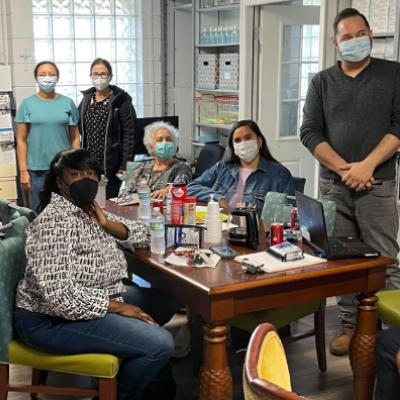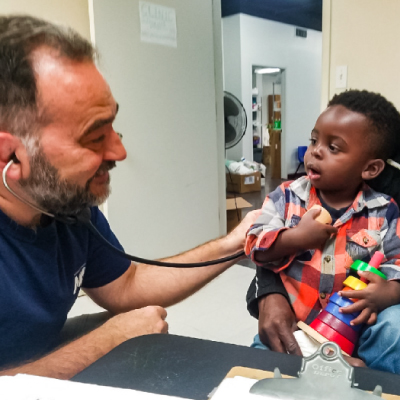- Who We Are
- Clinician Employment
- Publications
- Witness to Witness (W2W)
- El Premio Kugel & Zuroweste a la Justicia en la Salud
- Your Voice Matters: Photovoice Project
Tue, 08/25/2020 | by MCN Admin


Several months into the COVID-19 pandemic, Migrant Clinicians Network’s Alma Galván MCH, MCN’s Senior Program Manager, approached Kaethe Weingarten, PhD, Director of the Witness to Witness (W2W) program, to talk about the virus, its disproportionate effects on Latinx communities, and the short- and long-term mental health consequences on community health workers (CHWs), those trying to bolster the health of those ravaged communities, as the virus raged on.
"I immediately saw that Alma was right: that the material W2W was using in the webinars could be developed for peer support groups to better support those on the frontlines,” Dr. Weingarten said. With Deliana Garcia, MA, MCN’s Director of International Projects and Emerging Issues, Dr. Weingarten and Galván rapidly and intensively developed a psychosocial support pilot project, through a partnership with the Ventanilla de Salud (VdS). With offices in each state’s Mexican Consulate, VdS aims to increase access to health care and health literacy for Mexican nationals and other Latinxs across the country. MCN, a longtime partner with the VdS, recruited 23 CHWs from different consulates to join in on the short pilot program, which was to be conducted virtually and entirely in Spanish over the course of three sessions. Dr. Weingarten and a W2W volunteer Sol D'Urso developed the curriculum and then D'Urso and Galván adapted it into Spanish. D'Urso led the training of four volunteer facilitators, all of whom were Latinx immigrant CHWs themselves, into the W2W approach to psychosocial support in general and the curriculum in particular.
The curriculum aimed to help CHWs develop strategies to cope with three key topics, one covered per session: stress, grief, and resilience. The three sessions took place in June 2020. Over the 90-minute sessions, participants gained skills and resources to manage stress and grief and foster resilience in themselves, and most critically, to then utilize those tools to bolster community mental health by improving self-efficacy in talking to immigrants about managing stress, grief, and resilience. “It is very important, this application of the learning they obtained so they can assist other immigrants,” emphasized Galván. "This pilot project shows that if we do short interventions and short trainings with those who are working with essential workers, they can help normalize the feelings of stress and anxiety that so many people are currently having – and reduce the stigma around mental health needs. We think that as a consequence of that, agricultural workers and others they work with will feel more understood, and more able to say, ‘I need help,’ and maybe reach out for help.”
Additionally, and critically, the sessions created a space, albeit short-term, for participants to be in community together. “We know that peer support and a sense that we are not alone is a key factor in sustaining resilience during challenging times. The participants immediately recognized each other as comrades and bonded with each other and the facilitators,” said Weingarten. In August 2020, Danna Carter, PhD, LMFT reviewed collected pre- and post-series data to determine the efficacy of the sessions. She analyzed demographics, participants’ questionnaires on self-efficacy and personal stress levels that were completed upon registration and after the series concluded, plus additional data and qualitative feedback gathered after each session. Her analysis found significant outcomes in each of the following five domains: (1) levels of stress and well-being; (2) relationship alliance; (3) self-efficacy and interesting findings in two domains 4) session feedback; and (5) process evaluation. (See text box for an excerpt from the executive summary on each of the five domains.)
“These results are very encouraging about the value of combining knowledge acquisition, skill development and peer support during times of high stress. Participants not only felt better themselves but felt better prepared to do their jobs. We are excited about extending our methodology to other settings,” said Dr. Carter.
There were limitations to the data. All but one of the participants, facilitators, and MCN staff support were female, which may have skewed the development of a sense of community over just the short three-week time frame. At present, the results reflect participant outcomes directly after the end of the project; the pilot project developers plan to evaluate how long the positive results of the sessions will hold. “Still, we are encouraged that CHWs are able to benefit from short-term virtual communities of support, a modality that will be with us for months to come,” said Dr. Weingarten.
Executive Summary Excerpt: Key Findings from Dr. Carter
In this excerpt from the Executive Summary of her report, Dr. Carter shared the outcomes of the Witness to Witness psychosocial pilot project in five domains:
Levels of Stress and Well-being: The program was successful in achieving significant wellbeing gains. At the end of the W2W VDS Pilot Project, the number of individuals reporting moderate to severe levels of depressive symptoms notably decreased from 30.43% to 14.28% just after three peer-to-peer group sessions. Additionally, if participants entered the program reporting higher stress levels, there was a further reduction in reports of depressive symptoms compared to the participants who entered the program with lower levels of stress based on their reports at the time they filled in the application forms.
Relationship Alliance: In parallel to the wellbeing gains, there were notable outcomes linked to the relationship alliance between participants and facilitators. Based on the Session Rating Scale (SRS) reports, the measure of therapeutic alliance was above the cutoff score (36 points) for all of the 3 W2W group sessions. Participants in this program reported a “strong” alliance with their facilitator which increased from session 1 to 3.
Session Feedback: The majority of the participants reported being completely satisfied with their experience throughout the program. After the first session, 73.9% of participants rated themselves as completely satisfied with their experience and by the end of the program, this percentage increased to 90.5%.
Self-Efficacy: When participants were asked to self-report their own sense of self-efficacy based on their knowledge and ability to address major themes such as grief, loss, and resilience, the majority (85.7%) of the participants agreed or strongly agreed that the W2W peer-to-peer support group offered new areas of knowledge, information, and methods they could use on their jobs to assist their constituents during these challenging times. Overall, participants reported higher levels of self-efficacy across several domains measured in this study.
Process Evaluation: The program achieved an impressive level of participation and retention. Of the 23 participants who joined the program, only 2 participants dropped out before completing the sessions. In this case, the program maintained a 91.3% retention rate during the program delivery phase of this study. During the process evaluation phase of the program, facilitators provided insight into their experiences during 3 feedback sessions. Overall, facilitators identified and described the value of creating an online community of support during uncertain times as being extremely beneficial to participants of the program.
In this excerpt from the Executive Summary of her report, Dr. Carter shared the outcomes of the Witness to Witness psychosocial pilot project in five domains:
Levels of Stress and Well-being: The program was successful in achieving significant wellbeing gains. At the end of the W2W VDS Pilot Project, the number of individuals reporting moderate to severe levels of depressive symptoms notably decreased from 30.43% to 14.28% just after three peer-to-peer group sessions. Additionally, if participants entered the program reporting higher stress levels, there was a further reduction in reports of depressive symptoms compared to the participants who entered the program with lower levels of stress based on their reports at the time they filled in the application forms.
Relationship Alliance: In parallel to the wellbeing gains, there were notable outcomes linked to the relationship alliance between participants and facilitators. Based on the Session Rating Scale (SRS) reports, the measure of therapeutic alliance was above the cutoff score (36 points) for all of the 3 W2W group sessions. Participants in this program reported a “strong” alliance with their facilitator which increased from session 1 to 3.
Session Feedback: The majority of the participants reported being completely satisfied with their experience throughout the program. After the first session, 73.9% of participants rated themselves as completely satisfied with their experience and by the end of the program, this percentage increased to 90.5%.
Self-Efficacy: When participants were asked to self-report their own sense of self-efficacy based on their knowledge and ability to address major themes such as grief, loss, and resilience, the majority (85.7%) of the participants agreed or strongly agreed that the W2W peer-to-peer support group offered new areas of knowledge, information, and methods they could use on their jobs to assist their constituents during these challenging times. Overall, participants reported higher levels of self-efficacy across several domains measured in this study.
Process Evaluation: The program achieved an impressive level of participation and retention. Of the 23 participants who joined the program, only 2 participants dropped out before completing the sessions. In this case, the program maintained a 91.3% retention rate during the program delivery phase of this study. During the process evaluation phase of the program, facilitators provided insight into their experiences during 3 feedback sessions. Overall, facilitators identified and described the value of creating an online community of support during uncertain times as being extremely beneficial to participants of the program.
What is Witness to Witness?
Witness to Witness (W2W), a program sponsored by Migrant Clinicians Network, serves those who are in high stress jobs working with vulnerable clients who are themselves experiencing high levels of stress. Originally designed to assist those working with asylum seekers, detainees, migrants, climate refugees and immigrants at the border, W2W has expanded to serve a range of providers in many parts of the country who work with vulnerable populations. Those we serve may be suffering from stress, empathic stress, moral distress and/or moral injury. Learn more about W2W and sign up for a peer support webinar at the W2W page: https://www.migrantclinician.org/witness-to-witness.
Witness to Witness (W2W), a program sponsored by Migrant Clinicians Network, serves those who are in high stress jobs working with vulnerable clients who are themselves experiencing high levels of stress. Originally designed to assist those working with asylum seekers, detainees, migrants, climate refugees and immigrants at the border, W2W has expanded to serve a range of providers in many parts of the country who work with vulnerable populations. Those we serve may be suffering from stress, empathic stress, moral distress and/or moral injury. Learn more about W2W and sign up for a peer support webinar at the W2W page: https://www.migrantclinician.org/witness-to-witness.
Like what you see? Amplify our collective voice with a contribution.
Got some good news to share? Contact us on our social media pages above.
Return to the main blog page or sign up for blog updates here.







